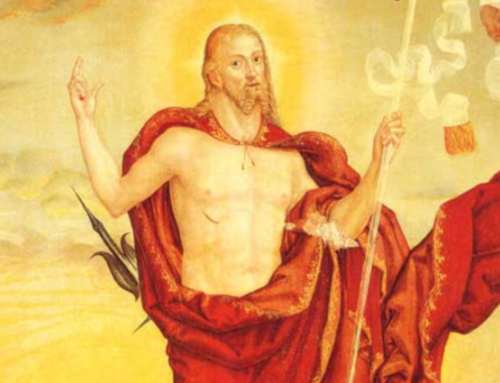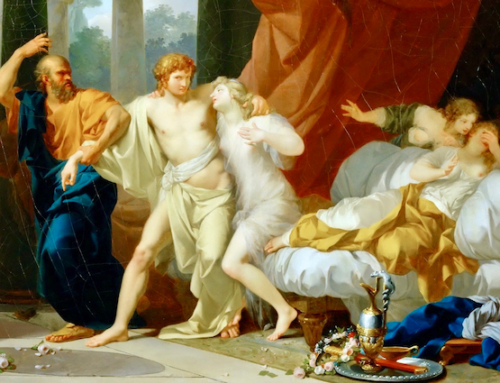 The Russian philosopher S.L. Frank is not someone whose name comes up often among conservative cultural commentators anymore–if it ever enjoyed such currency. Indeed, I suspect that even when his works were more current, he was overshadowed in the Anglophone world by other more prominent contemporaries, such as Nicholas Berdyaev. That’s a shame. In his 1930 book, The Spiritual Foundations of Society, Frank offers a refreshing vision of a conservatism that cannot survive apart from creativity.
The Russian philosopher S.L. Frank is not someone whose name comes up often among conservative cultural commentators anymore–if it ever enjoyed such currency. Indeed, I suspect that even when his works were more current, he was overshadowed in the Anglophone world by other more prominent contemporaries, such as Nicholas Berdyaev. That’s a shame. In his 1930 book, The Spiritual Foundations of Society, Frank offers a refreshing vision of a conservatism that cannot survive apart from creativity.
The book is a remarkable tour de force of intelligent, nuanced, and in some ways even prescient Christian social thought. One can find references—some explicit, some in Frank’s own words—to personalism, natural law, solidarity, subsidiarity, sphere sovereignty, organicism, and ordered liberty, among others. These are all tied together through the uniquely Russian Orthodox concept of sobornost’ and its counterpart obshchestvennost’, the inner, supratemporal spiritual unity of society and its outer, temporal and mechanical form, respectively. Through these two lenses, he examines the perennial questions of social life: individualism and collectivism, morality and law, hierarchy and equality, the state and civil society, inter alia.
In the course of expounding his social philosophy, Frank also addresses the “dual-unity” of conservativism and creativity. Inspired, no doubt, by Vladimir Soloviev before him, Frank wrote, “Whenever the principle of the conservation of the old, of fixed traditions, is so intense and all-encompassing that it begins to engulf and suppress the freedom of individual initiative and creativity, then the primordial ground and real ontological substrate of social life—spiritual life—begins to die.” He continued to explain that “the blocked flow of spiritual creativity becomes a destructive whirlpool of revolt, is inwardly poisoned by this its morbid distortion, which transforms it from a creative principle into a destructive one. Conservation becomes destruction.” So for Frank, there can be no true conservativism without creativity or, we might say, imagination. “Conservativism which becomes reactionary, the tendency to conserve not life but lifeless ossified forms, is destructive in its very essence,” he wrote, inspiring the destructive force of revolutionary fervor.
Conversely, creativity would itself turn reactionary and regressive without deep cultural roots. “One the other hand,” said Frank, “when the principle of creative initiative does not peacefully mature in the womb of past traditions, is not nourished by the forces of tradition, it is always inwardly impotent, lacks the principle of genuine creativity, which always presupposes birth from the deep primordial core of being.” Imagination cannot be baseless but must stand upon what Russell Kirk would call the “permanent things” of life preserved by the institutions and mores of the past. As a result, to Frank,
Every decisive, radical break with tradition is the separation of a sprout from the nurturing soil. The appearance of novelty may remain, but the more this thirst for the new assumes the character not of positive creativity but of pure negation of the old, the more it spiritually reverts in this very negation to the old and becomes enchained to the old.
If one innovates simply to innovate, one will either find oneself, having won the reactionary fight, as now part of the new establishment or else stuck forever rebelling, dissatisfied, cynical, and restless. Those who wish for progress will not find it apart from conservatism.
 Frank, who had previously survived the Bolshevik revolution in 1917, had little sympathy for such revolutionary romanticism and was an outspoken critic well before that tragedy came upon his native Russia. “Radicalism which has become revolt, revolution,” he wrote, “is reactionary in its very essence, for in destroying it leads not to the advancement but to the regression and reduction of life.”
Frank, who had previously survived the Bolshevik revolution in 1917, had little sympathy for such revolutionary romanticism and was an outspoken critic well before that tragedy came upon his native Russia. “Radicalism which has become revolt, revolution,” he wrote, “is reactionary in its very essence, for in destroying it leads not to the advancement but to the regression and reduction of life.”
For Frank one cannot engage any aspect of society or culture with an impoverished, myopic emphasis on either conservatism or creativity. As he writes regarding politics,
True, ontologically grounded politics is essentially and always the politics of spiritually free conservatism, not stifled by prejudices and dead habits; true, ontologically grounded politics is always the politics of innovation, which draws its creative forces from reverent respect for the living content of the spiritual life of the past.
His emphasis here on politics being “ontologically grounded” refers again to the idea of sobornost’. While not denying the importance of the individual, Frank insists that society and social groups are more than an aggregate of their members. By bonds deeper than the free ascent of contract theory, despite its legitimate insights, human beings find themselves to be parts of social groups, beginning with the family and then religion and other forms of life.
In both family and religion, the heritage of the past lives on in the future, not just through genetics, but through actions, wisdom, traditions, laws, and so on, which shape the individuals within groups and live on through them. The same applies to political communities. And religious groups, to Frank, are perhaps the most fundamental in that participation in a common, spiritual reality that transcends the individual (i.e. in sobornost’) is at their basis. “In religious consciousness,” he wrote, “man lives not inside his isolated, closed being, but precisely through his connection with that in which he is rooted, with that out of which nourishing spiritual forces flow.”
Thus the vision of society that emerges from Frank is one where the institutions of the past are nourished by religious roots that live on in the creative forces of individuals and groups in the present. In a unique and consistent way, he manages to keep both conservatism and creativity in tension in a way that leads to clarity rather than contradiction. For those today who wish to avoid the pitfall of “conserv[ing] not life but lifeless ossified forms,” I would commend revisiting S. L. Frank’s The Spiritual Foundations of Society for a fresh perspective on that timeless, “spiritually free conservatism” from one luminary of “the spiritual life of the past.”
Books on the topic of this essay may be found in The Imaginative Conservative Bookstore.








Leave A Comment